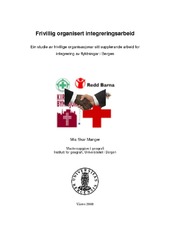| dc.description.abstract | The aim of this master thesis was to examine Non Governmental Organizations' (NGOs) programmes for integration of refugees as a necessary supplement to the governmental programme. A relatively recent law made it compulsory for newly arrived refugees to attend classes in Norwegian language and Norwegian culture and society. This governmental programme also offers other courses and work experience over a 37.5 hour paid week. In addition, several NGOs offer a variety of programmes. In Bergen, Norway, 35 refugees each year join a Red Cross programme called The Refugee Guide", as a part of this 37.5 hour work-week. This programme offers refugees a new friend and a guide to the Norwegian society. The refugee guides are volunteers who are interested to get to know their new fellow citizens. This thesis focused on this Red Cross programme and the programme Ada" of another well known Norwegian NGO. Ada encompasses kindergartens where parents join their children, an international programme called Home-start which gives families who struggle a qualified volunteer to lean on, and a group for immigrant women. These two, and other NGOs, attempt to offer solutions to the problem of lack of contact between the majority and minority groups. Several qualitative methods were used to assess the programmes of these NGOs. Semi- structured interviews were used to interview employees of the NGOs and of the governmental programme. Focus groups were used to gather information from refugees using The Refugee Guide". In addition, two published studies with quantitative data were used as a supplement to the qualitative data. The results of this study showed that users of The Refugee Guide and Ada were satisfied with the programmes. Public servants also approved of these programmes and were pleased that these NGOs were covering areas they could not. They teached the language, helped with housing and prepare the refugees for working life. However, there was a great need of social contact, a larger network and friends and the NGOs were doing a good job bringing Norwegians, refugees and other immigrants together. This contact was important for the integration of refugees for three reasons: many refugees were lonely, and in need of new friends, thus having Norwegian friends could raise the refugees' self-esteem; refugees needed Norwegian friends to learn more about Norwegian customs and norms; and refugees needed Norwegian friends to practice the language. These areas were lacking in the public programme, and could not be provided by the public servants. In conclusion, The Refugee Guide" and Ada" provide a necessary supplement to the governmental programme. Indeed, the quality of some people's lives had improved by participating in these programmes. Public servants should receive more information about what these NGOs can offer to improve integration to help them provide a better service to the refugees they work for. | en_US |
